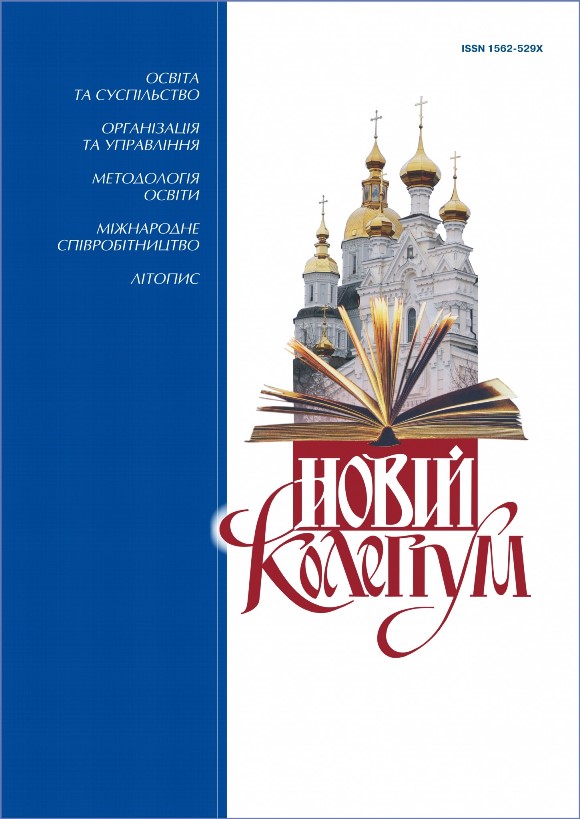Peculiarities of master’s teacher training in distance education in Turkey
DOI:
https://doi.org/10.30837/nc.2023.3.82Keywords:
distance education, curriculum, teacher training, master degree, TurkeyAbstract
The reform of higher education assumes a transition to the preparation of masters in education by introducing modern approaches to mastering innovative technologies of mass education, taking into account world experience and meeting the needs for self-learning and self-improvement throughout life. In turn, distance education every year more and more actively influences the classical forms of education, enriching traditional education with innovative content and organizational components.
Comparative studies testify that distance learning can be as effective as classroom learning, if the methods and technologies meet the tasks, there is interaction between students, and there is timely feedback between the teacher and the student. Successful distance learning programs are based on consistent and comprehensive efforts of students, teachers, coordinators, support staff and administration.
As a result of the analysis of foreign experience, it was revealed that the introduction of mass open distance courses as a form of education requires further improvement of their organization and curriculum. It is outlined that for the implementation of such courses in the process of master's teacher training, the content of educational and scientific programs and educational and professional characteristics of the future specialist should be observed; mass open distance courses must be included in the curriculum, where the number of hours and credits for studying the relevant discipline is clearly indicated; curricula must be improved by introducing a new form of education.
Distance education offers prospective and practicing teachers both skills training and the opportunity to complete teacher training programs or obtain a degree. The distribution of distance teacher training programs is not limited to developed or developing countries, nor to specific delivery methods. This proliferation is the result of the rapid development of telecommunications technologies combined with a growing awareness of ways to use technology for teacher training.
Thus the content analysis of the professional literature on the problem of scientific research made it possible to identify and summarize the pecularities of masters teacher training in distance education in Turkey: the use of active and mass learning methods; methods for assessing the progress of applicants for higher education, methods of mass self-education, introspection and self-correction of knowledge; conducting courses through videoconferencing, virtual classes and forums with synchronous interaction between students and teachers; communication through forums, online conversations and online interviews; use of various printed, visual, classroom and electronic materials. The predictive potential of scientific research is due to the potential possibility of further scientific research on the problem of the curriculum developing of master’s teacher training in distance education in Turkey.
References
Абакумова О. О. Феномен дистанційної освіти : монографія ; за заг. ред. А. А. Мельниченка. Київ : Видав. дім «АртЕк», 2021. 212 с.
Бацуровська І. В. Теоретичні і методичні засади освітньо-наукової підготовки магістрів в умовах масових відкритих дистанційних курсів: 13.00.04 : автореф. дис. … д-ра пед. наук ; Мін-во освіти і науки України ; Житомир. держ. ун-т ім. Івана Франка. Житомир, 2019. 42 с. http://eprints.zu.edu.ua/27973/1/avt_Batsurovska.pdf.
Бацуровська І. В. Теоретичні і методичні засади освітньо-наукової підготовки магістрів в умовах масових відкритих дистанційних курсів: 13.00.04 : дис. … д-ра пед. наук; Житомир. держ. ун-т імені Івана Франка ; Мін-во освіти і науки України. Житомир, 2018. 638 c.
Данилишена Т. Етапи становлення дистанційної освіти як інноваційної форми навчання магістрів // Вісник Львів. ун-ту. Cер. педагогічна. 2008. Вип. 24. С. 46 – 52. https://pedagogy.lnu.edu.ua/departments/pedagogika/periodic/visnyk/24/05_danylyshena.pdf.
Рокосовик Н. В. Зарубіжний досвід підготовки педагогів засобами дистанційного навчання // Наук. вісник Ужгород. ун-ту. Сер. Педагогіка. Соціальна робота. 2016. Вип. 2 (39). С. 207 – 209.
Світовий досвід організації та розвитку університетської системи дистанційного навчання [Уклад. І. В. Кулага, Д. О. Ільницький, С. О. Стрельник та ін.]. Київ : Ін-т вищої освіти ; КНЕУ імені Вадима Гетьмана, 2013. 38 с.
Anadolu University: Open Education System. 2019. 28 p. https://www.anadolu.edu.tr/uploads/anadolu/ckfinder/aof/files/factsandfigures.pdf.
Çakır Ö. and Oguz E. Situations of distance education institutions in Turkey // Procedia Social and Behavioral Sciences. 2010. 9. Р.1722 – 1730.
Çekerol G. S. Master’s Degrees In Distance Education In Turkey and Opinions Of Students // Kırklareli Üniversitesi Sosyal Bilimler Dergisi. 2018. 2 (1). P. 91 – 107.
Özkul A. E. Anadolu University, Turkey. İçinde V. V. Reddy ve S. Manjulika (Eds.) The World of Open and Distance Learning // New Delhi: Viva Books Private, 2000. Р. 95 – 112.
Riel M. Building a new foundation for global communities. The Writing Notebook (January/February), 1990. Р. 35 – 37.
Ruzgar N. S. Distance Education in Turkey. Turkish Online Journal of Distance Education-TOJDE. 2004. 5 (2). P. 22 – 32.
Turkmen H. Exploring Turkish science education faculties' understanding of educational technology and use // International Journal of Education and Development using ICT. 2006. 2 (2). http://ijedict.dec.uwi.edu/viewarticle.php?id=163&layout=html.
Usun S. The Applications And Problems On The Distance Teacher Training in Turkey // Turkish Online Journal of Distance Education –TOJDE. 2003. 4 (4). https://dergipark.org.tr/tr/download/article-file/156595.

